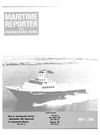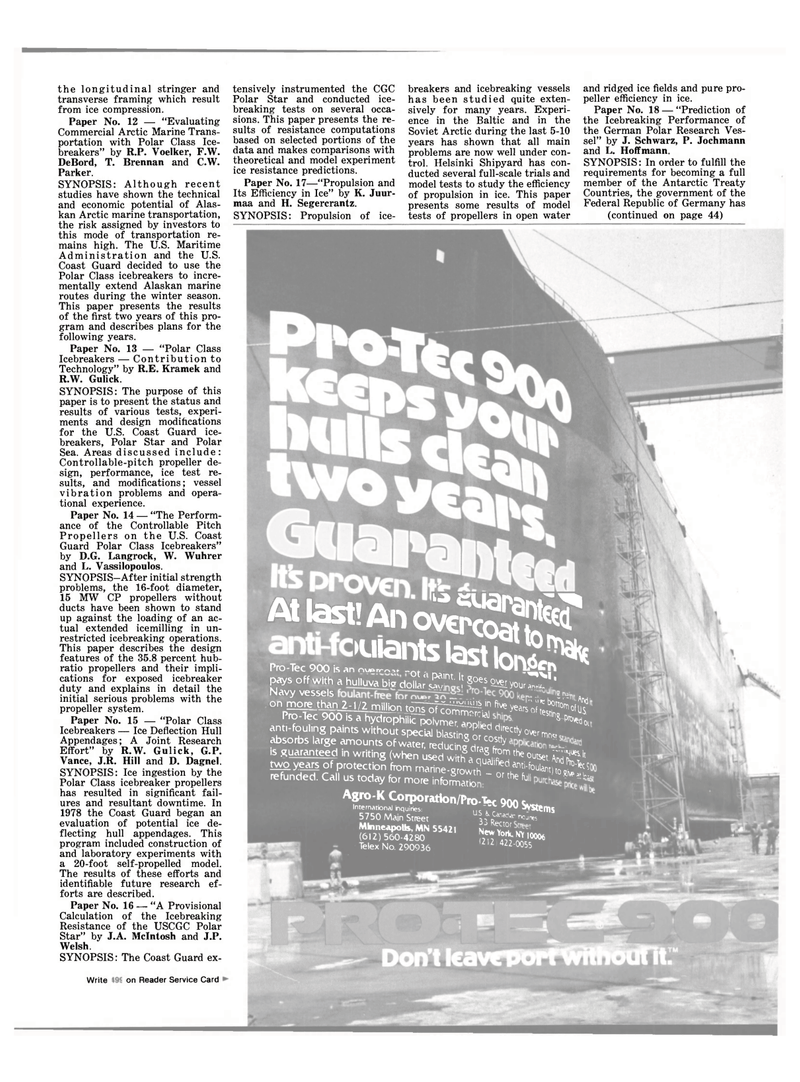
Page 39: of Maritime Reporter Magazine (May 1981)
Read this page in Pdf, Flash or Html5 edition of May 1981 Maritime Reporter Magazine
the longitudinal stringer and transverse framing which result from ice compression.
Paper No. 12 — "Evaluating
Commercial Arctic Marine Trans- portation with Polar Class Ice- breakers" by R.P. Voelker, F.W.
DeBord, T. Brennan and C.W.
Parker.
SYNOPSIS: Although recent studies have shown the technical and economic potential of Alas- kan Arctic marine transportation, the risk assigned by investors to this mode of transportation re- mains high. The U.S. Maritime
Administration and the U.S.
Coast Guard decided to use the
Polar Class icebreakers to incre- mentally extend Alaskan marine routes during the winter season.
This paper presents the results of the first two years of this pro- gram and describes plans for the following years.
Paper No. 13 — "Polar Class
Icebreakers — Contribution to
Technology" by R.E. Kramek and
R.W. Gulick.
SYNOPSIS: The purpose of this paper is to present the status and results of various tests, experi- ments and design modifications for the U.S. Coast Guard ice- breakers, Polar Star and Polar
Sea. Areas discussed include:
Controllable-pitch propeller de- sign, performance, ice test re- sults, and modifications; vessel vibration problems and opera- tional experience.
Paper No. 14 — "The Perform- ance of the Controllable Pitch
Propellers on the U.S. Coast
Guard Polar Class Icebreakers" by D.G. Langrock, W. Wuhrer and L. Vassilopoulos.
SYNOPSIS-After initial strength problems, the 16-foot diameter, 15 MW CP propellers without ducts have been shown to stand up against the loading of an ac- tual extended icemilling in un- restricted icebreaking operations.
This paper describes the design features of the 35.8 percent hub- ratio propellers and their impli- cations for exposed icebreaker duty and explains in detail the initial serious problems with the propeller system.
Paper No. 15 — "Polar Class
Icebreakers — Ice Deflection Hull
Appendages; A Joint Research
Effort" by R.W. Gulick, G.P.
Vance, J.R. Hill and D. Dagnel.
SYNOPSIS: Ice ingestion by the
Polar Class icebreaker propellers has resulted in significant fail- ures and resultant downtime. In 1978 the Coast Guard began an evaluation of potential ice de- flecting hull appendages. This program included construction of and laboratory experiments with a 20-foot self-propelled model.
The results of these efforts and identifiable future research ef- forts are described.
Paper No. 16 — "A Provisional
Calculation of the Icebreaking
Resistance of the USCGC Polar
Star" by J.A. Mcintosh and J.P.
Welsh.
SYNOPSIS: The Coast Guard ex-
Write 187 on Reader Service Card 41 tensively instrumented the CGC
Polar Star and conducted ice- breaking tests on several occa- sions. This paper presents the re- sults of resistance computations based on selected portions of the data and makes comparisons with theoretical and model experiment ice resistance predictions.
Paper No. 17—"Propulsion and
Its Efficiency in Ice" by K. Juur- maa and H. Segercrantz.
SYNOPSIS: Propulsion of ice- breakers and icebreaking vessels has been studied quite exten- sively for many years. Experi- ence in the Baltic and in the
Soviet Arctic during the last 5-10 years has shown that all main problems are now well under con- trol. Helsinki Shipyard has con- ducted several full-scale trials and model tests to study the efficiency of propulsion in ice. This paper presents some results of model tests of propellers in open water and ridged ice fields and pure pro- peller efficiency in ice.
Paper No. 18 — "Prediction of the Icebreaking Performance of the German Polar Research Ves- sel" by J. Schwarz, P. Jochmann and L. Hoffmann.
SYNOPSIS: In order to fulfill the requirements for becoming a full member of the Antarctic Treaty
Countries, the government of the
Federal Republic of Germany has (continued on page 44)
Attest! Ano^^
Pro Tec 900 is an ^^ ^St lOMCh^ pays off with a hulluvato doL<5?™' 'l S°es yourT?''
Navy vessels onJMLthan^d^ " five years Z^of^ to-lec 900 islThydrophiH^^ Tn^u!^^W* anti-fouling paints without special blastino ? dlrecrtV over mn« absorbs large amounts ofJS^SlT^ is guaranteed in writing (when u*d 8 the out*, >< ^ Years of protection f^r^^^^f^^ refunded. Call us today for more infoS" ~ ful1
Agro-K Corporation/Pro w onn c.
International inquiries: i.e. ^VSterTIS 5 7 50 Main Street \ > DCar'ad*- "flumes
Minneapolis, MN 55421 S (612)560-4280 2?? 10006
Telex No. 290936 212 422-0055

 38
38

 40
40
